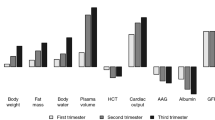Summary
The distinction between chronic hypertension, gestational hypertension, and preeclampsia is essential for the choice of the adequate pharmacotherapy. In chronic and gestional hypertension there is a positive prognosis for mother and child. Mostly, there is no need for pharmacotherapy in gestational hypertension and in chronic hypertension pharmacotherapy is only necessary in serious cases. Particularly in chronic hypertension the application of antihypertension drugs allows the woman to carry the child to full term. In contrast, preeclampsia represents potential danger for mother and fetus. In this case pharmacotherapy rarely shows satisfactory results. Only frequent clinical control and a premature delivery are considered adequate measures. Methyldopa is a well known antihypertensive drug for long-term therapy. Concerning adverse events in the mother modern antihypertensive drugs have disadvantages in relation to but there are advantages in terms of protection for the fetus. Of methyldopa ineffective is or cannot be tolerated of the β-blocker metoprolol can be alternatively applied. In case of emergency dihydralazine or – as as second choice – clonidine is appropiate.
Zusammenfassung
Für die Therapie des arteriellen Bluthochdruckes ist eine Unterscheidung in chronische Hypertonie, Gestationshypertonie und Präeklampsie wesentlich. Die Prognose für Mutter und Kind ist gut, sofern es sich um eine chronische oder Gestationshypertonie handelt. Während die Gestationshypertonie meist ohne medikamentöse Therapie auskommt, müssen bei der chronischen Hypertonie nur die schweren Formen behandelt werden. Die Pharmakotherapie mit Antihypertensiva besonders im Hinblick auf die chronische Hypertonie erlaubt es der Frau, die Schwangerschaft auszutragen. Die Präeklampsie stellt eine potentielle Gefahr für Mutter und Feten dar, die sich nur unbefriedigend mit Antihypertensiva beeinflussen läßt. Nur eine engmaschige medizinische Überwachung und eine frühzeitige Entbindung als einzige kausale Therapie stellen adäquate Maßnahmen dar. Als Antihypertensivum der Wahl für die Langzeittherapie gilt das alteingeführte Medikament Methyldopa, das hinsichtlich seines Nebenwirkungsprofil bei der Mutter gegenüber modernen Antihypertensiva im Nachteil ist; es bietet aber einen höheren Schutz für den Feten. Bei Unverträglichkeit und Ineffektivität von Methyldopa kann auf den β-Blocker Metoprolol ausgewichen werden. Für die Akutsituation ist besonders Dihydralazin geeignet. Als Mittel der 2. Wahl gilt Clonidin.
Similar content being viewed by others
Author information
Authors and Affiliations
Rights and permissions
About this article
Cite this article
Feuring, M., Melchert, F. & Wehling, M. Pharmacotherapy for hypertoniain pregnancy. Gynäkologe 32, 443–449 (1999). https://doi.org/10.1007/PL00003252
Published:
Issue Date:
DOI: https://doi.org/10.1007/PL00003252




